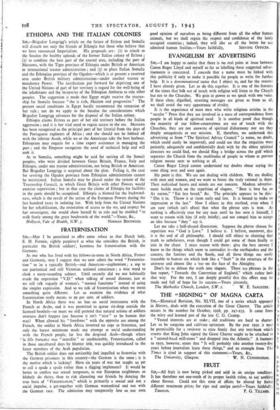EVANGELISM BY ADVERTISING
Sto,—I am happy to notice that there is no real point at issue between Canon Roger Lloyd and myself so far as labelling these suggested adver- tisements is concerned. I concede that a name must be linked with this publicity if only to make it possible for people to write for further help. It is a denominational name that I object to, and for -the reasons I have already given. Let us do this together. It is one of the features of the times that folk out of touch with religion will listen to the Church but not to the Churches. We gain in power as we speak with one voice. If these dear, dignified, arresting messages are given as from us all, we shall avoid the very appearance of rivalry.
It is the experience of most men who write religious articles in the " secular " Press that they are involved in a mass of correspondence from
people in all kinds of spiritual need. It is another proof that though the majority of our fellow-countrymen are out of /ouch with the Churches, they are not unaware of spiritual disharmony nor are they deeply antagonistic to our mission. If, therefore, we undertook this advertising as from " The Spiritual Advice Council " (a name, no doubt, which could easily be improved), and could see that the enquiries were patiently, adequately and confidentially dealt with by the ablest spiritual directors we could find, we should fling a bridge across the gulf which separates the- Church from the multitudes of people to whom at present religion means next to nothing at all.
Canon Roger Lloyd cannot understand my doubts about saying the same thing over and over again. My point is this. We are not dealing with children. We are deaiing with men and women, and we want to foster the truly rational in them. Their individual hearts and minds are our concern. Modern advertise- ment builds much on the repetition of slogans. " Beer is best for an At nation," "Eat less bread," &c. The principle appears' to be this: " Din it in. Throw it at them early and late. It is bound to make an impression at the last." Now I object to this method, even when I am sure (which isn't often) that what the phrase says is true. As nothing is effectively true for any man until he has seen it himself, I want to reason with him (if only, briefly), and not compel him to accept an idea because " they " say it.
Let me take a half-absurd illustration. Suppose the phrase chosen for repetition was " God is Love." I believe it. I believe, moreover, that it is the end of all philosophy. I should still object to chanting that truth to unbelievers, even though I could get some of them finally to join in the chant.. I must reason with them: give the best answer I know to the things which seem to contradict it—the earthquakes and the cancers, the famines and the floods, and all those things not easily traceable to human sin which look like a " fault " in the structure of the universe and almost like a leer-on the face of the Almighty.
Don't let us debase the truth into slogans. There are phrases in the fine report, " Towards the Conversion of England," which rather look that way. For the rest, I am deeply grateful that this effort may be made and full of hope for its success.—Yours sincerely,
The Methodist Church, London, S.W. z. W. E. SANGSTER.






















 Previous page
Previous page